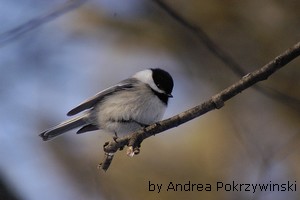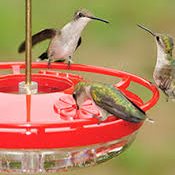
U.S. State Bird of Maine and Massachusetts
-
Black-capped Chickadee

The Black-capped Chickadee is the State Bird of two states: Maine and Massachusetts.
The Black-capped Chickadee is a common bird of northern forests. They are small birds, yet are able to survive harsh Northern winters and are one of the easiest birds to attract to a bird feeder.
- American Ornithologist'Union Common Name: Black-capped Chickadee
- Family: Paridae, Chickadees & Titmice
- Scientific name: Poecile atricappilus
- Length: 5.25 inches (13 cm)
- Diet: Insects, seeds, fruit, spiders and their eggs.
- Voice:
Song of most populations a simple, high, pure
whistle freebee, with second note lower than first and relative
pitch of two notes constant; sometimes sounds three-noted, second part
broken by slight falter but no real temporal break fee beeyee.
Common and familiar call chickadee dee dee dee. Contact call a
sharp chik or tsik slightly harsh, often leading into
chick-a-dee call. Gargle call a complex, descending jumble of
short notes and alarm a very high, thin series teeteeteeteetee;
both similar in all chickadees.
- Habitat: Mixed and deciduous woods; willow thickets, groves, shade trees, clearings, suburbs. Usually forages in thickets, low branches of trees.
- Displays: Courtship: simple pursuit of female by male.
- Number of broods: 1
- Nest: Excavates or enlarges snag cavity usually 4-8 feet, but up to 40 feet above ground; rarely in coniferous tree; lined with plant down, moss, feathers, hair, insect cocoons.
- Eggs: 6-8 white, finely marked with reddish browns. 0.6 inches (16 mm)
- Incubation period: 11-13 days
- Fledge: 14-18 days after hatching
- Longevity Record: 11 Years and 6 months. The most recent record was set in 2011 by a banded chickadee that was recaptured and released in Minnesota - (data from the USGS Bird Banding Lab).
Black-capped Chickadees Excavating a Nest Cavity
Black-capped Chickadee Hammering on a Sunflower Seed
The Chickadee was adopted as the Maine state bird by the Legislature in 1927. The Black-Capped Chickadee was adopted as the official Massachusetts State Bird by the legislature on March 21, 1941More information about the The Black-capped Chickadee, its life history, song and identification can be found here.
|
Our Favorite Bird Watching Binoculars, Squirrel-Proof Feeder & Hummingbird Feeder Read Our Reviews: |
||

Nikon Monarch M5
Best mid-priced bird watching binoculars. Waterproof, shockproof, multi-coated ED-Glass. |

|

Best Hummingbird Feeder
Drip-Free, Ant-moat, Durable, Easy to Fill and Clean. |
| Click Images or Links To View More Info | ||